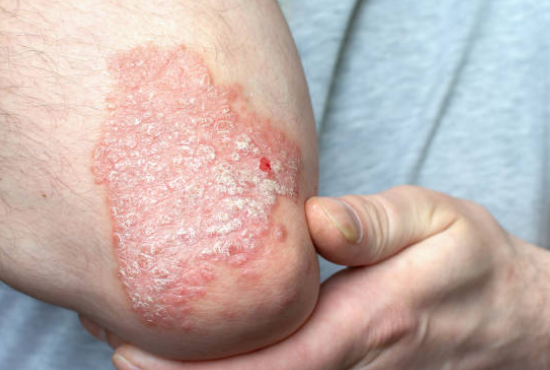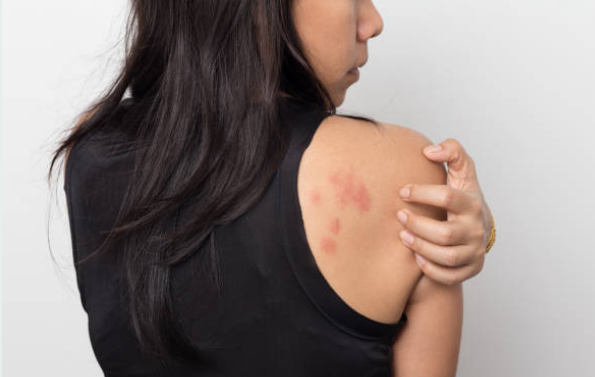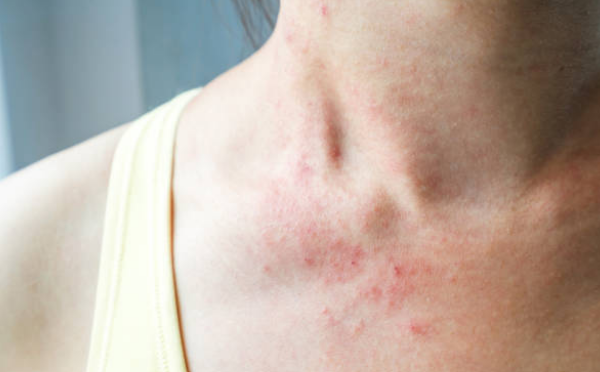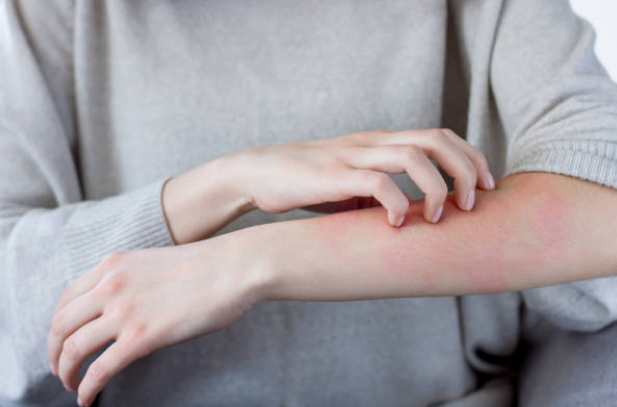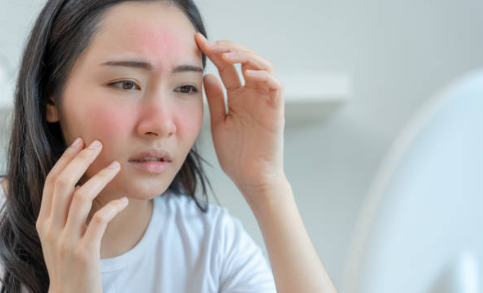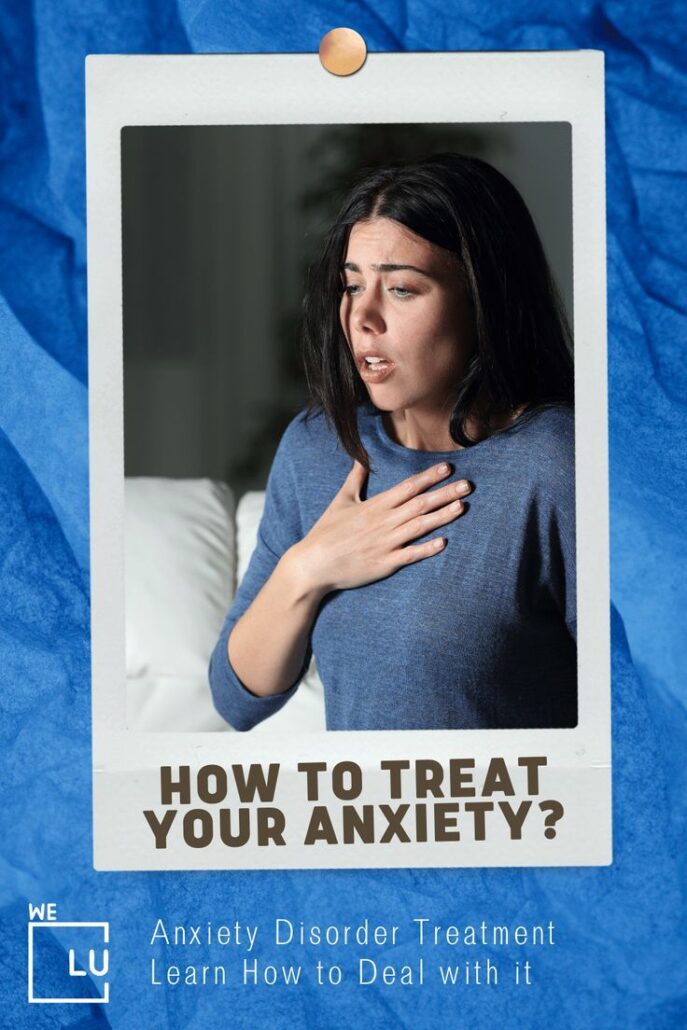What is an Anxiety Rash?
Anxiety can trigger the release of certain chemicals in the body, leading to physical reactions like an itchy skin rash or hives anywhere on the body. This rash is a result of high anxiety levels, not allergies or other factors. Long-term anxiety and stress heighten the body’s stress response through the sympathetic nervous system. This response releases histamine, a substance typically released in response to injury, inflammation, or allergies. More histamine can result in a rash or hives.
Short-term relief can come from topical treatments or antihistamines, but long-term solutions involve coping techniques to manage anxiety and reduce stress. Addressing stress and anxiety helps treat and prevent anxiety rashes.
Ignoring the emotional impact of an untreated anxiety rash can make stress and symptoms worse. To break this cycle and stay healthy, it’s crucial to address both the anxiety and the physical symptoms. Get medical advice, use coping strategies, and take action to prevent the anxiety rash from getting worse.
Emotional Effects of Anxiety Rashes
Anxiety-induced rash can worsen feelings of anxiety or embarrassment due to its symptoms or appearance. Attempts to conceal the rash with makeup, lotions, or tight clothing may aggravate the condition.
Typically, stress or anxiety-related rashes resolve within 24 hours, and the use of topical treatments can alleviate the inflammation and associated discomfort. Also, implementing calming techniques and tools to manage anxiety reduces overall stress and contributes to the effective treatment of the rash.
If you don’t treat an anxiety rash, it might stick around and get worse. High anxiety levels keep releasing stress-related chemicals, making the rash worse. Not dealing with anxiety can lead to long-term stress, which isn’t good for your skin.
What Does an Anxiety Rash Look Like?
An anxiety rash usually looks like red, raised bumps or welts on the skin, causing itching. It can appear anywhere on the body and might resemble hives.
The rash’s appearance, as shown below in anxiety rash pictures, varies among individuals based on skin sensitivity and the intensity of anxiety. Anxiety stressed stress rash is a physical symptom, and its look may change with emotional responses.
If you think you have an anxiety rash, consult We Level Up mental health professionals for a proper diagnosis and guidance on managing both the inflammation and the underlying anxiety.
Anxiety Stress Rash Pictures
Can Anxiety Cause a Rash?
Anxiety can cause a rash. When stressed or anxious, your body releases chemicals like histamine, leading to redness, itching, and inflammation. This rash is a physical sign of how your body reacts to stress. It’s essential to understand the link between mental well-being and physical symptoms. If you think anxiety is causing a rash or skin issues, consulting a healthcare professional can help you manage the condition effectively.
Anxiety Rash Symptoms
Anxiety rash symptoms may include red, raised bumps or welts on the skin, often accompanied by itching. Other physical signs of anxiety can vary widely among individuals and may encompass the following:
- Muscle Tension: Feeling tense, tight muscles, or experiencing muscle aches.
- Digestive Issues: Upset stomach, nausea, diarrhea, or other gastrointestinal discomfort.
- Headaches: Persistent or recurrent headaches, sometimes accompanied by tension.
- Sweating: Excessive sweating, especially in stressful situations.
- Fatigue: Feeling tired or lethargic, even without significant physical exertion.
- Heart Palpitations: Awareness of your heartbeat, rapid heart rate, or irregular heartbeats.
- Shortness of Breath: Difficulty breathing or a feeling of breathlessness.
- Trembling or Shaking: Involuntary trembling or shaking of the hands or other parts of the body.
- Dizziness: Feeling lightheaded or dizzy, potentially accompanied by faintness.
- Sleep Disturbances: Trouble falling asleep, staying asleep, or experiencing restless sleep.
These physical signs can coexist with emotional symptoms like excessive worry, restlessness, irritability, or difficulty concentrating.
If you’re experiencing persistent physical or emotional anxiety symptoms, seeking support from a healthcare professional is advisable for proper evaluation and guidance.
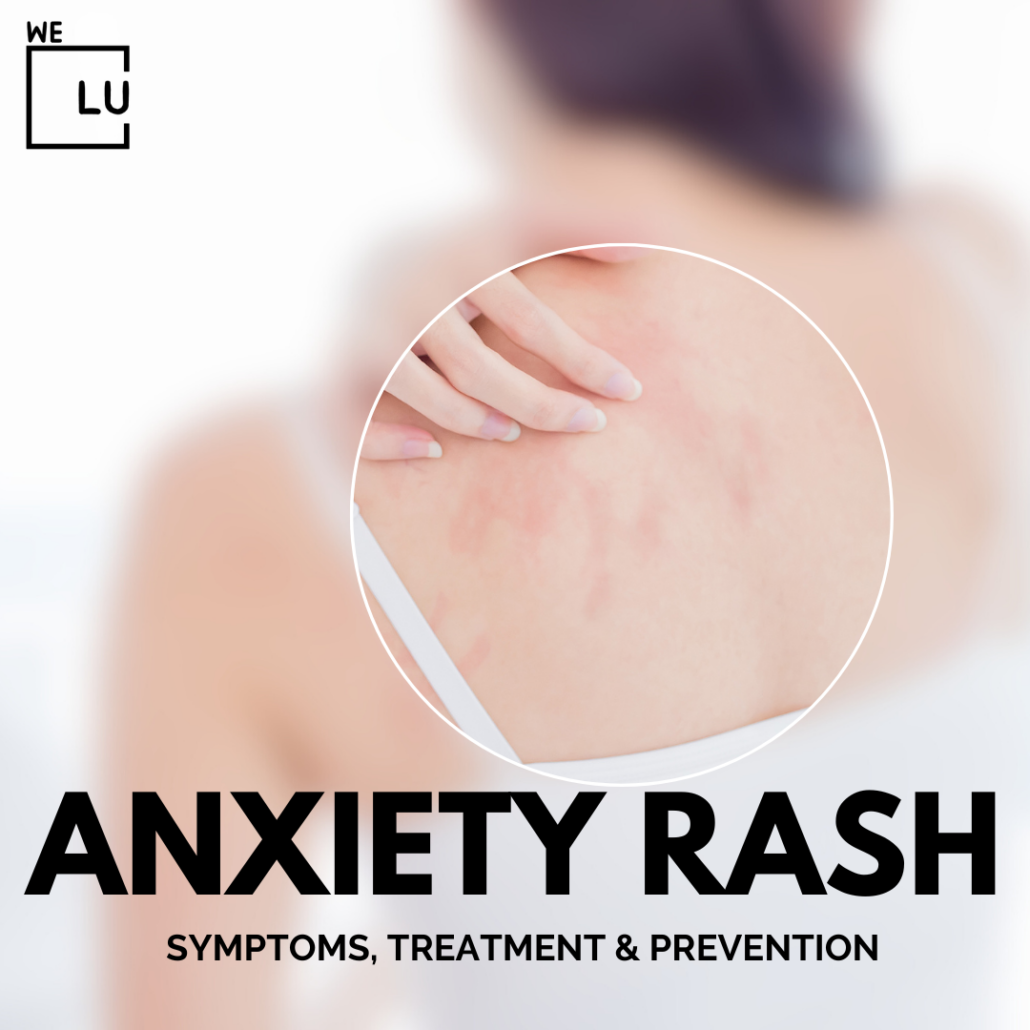
Skip To:
Learn More:
- What To Know About Stress Rash, Causes, Effects, and Treatment
- Guide to Anxiety Meditation 5-10 Minute Mindfulness Techniques
- Common Anxiety Medications, Types of Medication for Anxiety, and Side Effects
- How to Deal With Crippling Anxiety? Crippling Anxiety Symptoms, Causes, and Treatment
- Learn the Different Types of Anxiety. 6 Types of Anxiety Disorders. Symptoms and Medications for the Different Types of Anxiety.
- High Functioning Anxiety Symptoms, Causes, and Treatment
- Performance Anxiety, Causes, Symptoms, and Treatment. Male Performance Anxiety Solutions
- What are Anxiety Tics? Understanding The Background of Tics
- Social Anxiety Disorder, Symptoms, Risks, Treatments, and Diagnosis
- Anxiety Disorder Treatment, Types, Causes, and Symptoms
Get anxiety counseling that works to prevent further worsening anxiety rash. Discover professional help from We Level Up Florida’s mental health therapists. Start getting support with a free call to our mental health hotline.
We Level Up FL Mental Health Treatment Center Tips To Cope With Anxiety Rashes
✅ To cope with anxiety rashes, practice relaxation techniques like deep breathing, maintain a healthy lifestyle with balanced meals and regular exercise, and identify triggers to manage or avoid them.
✅ Use soothing lotions for relief, wear comfortable clothing, and seek emotional support from friends, family, or a mental health professional.
✅ Establishing a routine, staying hydrated, and consulting a healthcare professional if needed can also contribute to managing anxiety rashes effectively.
Get Help. Get Better. Get Your Life Back.
Searching for Accredited Dual Diagnosis Mental Health Centers Near You?
Even if therapy failed previously, or are in the middle of a difficult crisis, we stand ready to support you. Our trusted behavioral health specialists will not give up on you. When you feel ready or just want someone to speak to about counseling alternatives to change your life call us. Even if we cannot assist you, we will lead you to wherever you can get support. There is no obligation. Call our hotline today.
FREE 24/7 Dual Diagnosis Mental Health Services HotlineAnxiety Rash Treatment
Treating anxiety rashes involves a comprehensive approach that addresses both the underlying anxiety and the physical symptoms manifested on the skin.
The primary focus is on managing stress and anxiety levels to break the cycle of rash development. Relaxation techniques such as deep breathing, meditation, and mindfulness play a crucial role in calming the mind and reducing the release of stress-related chemicals that contribute to the rash.
In addition to addressing the root cause, topical treatments, such as soothing lotions, can relieve itching and promote skin healing. Seeking advice from a healthcare professional is essential for a personalized treatment plan. They may recommend specific medications, such as antihistamines, to alleviate symptoms or suggest lifestyle changes to manage anxiety better.
Combining emotional well-being practices with targeted skincare enables individuals to effectively navigate anxiety rash treatment and promote overall health.
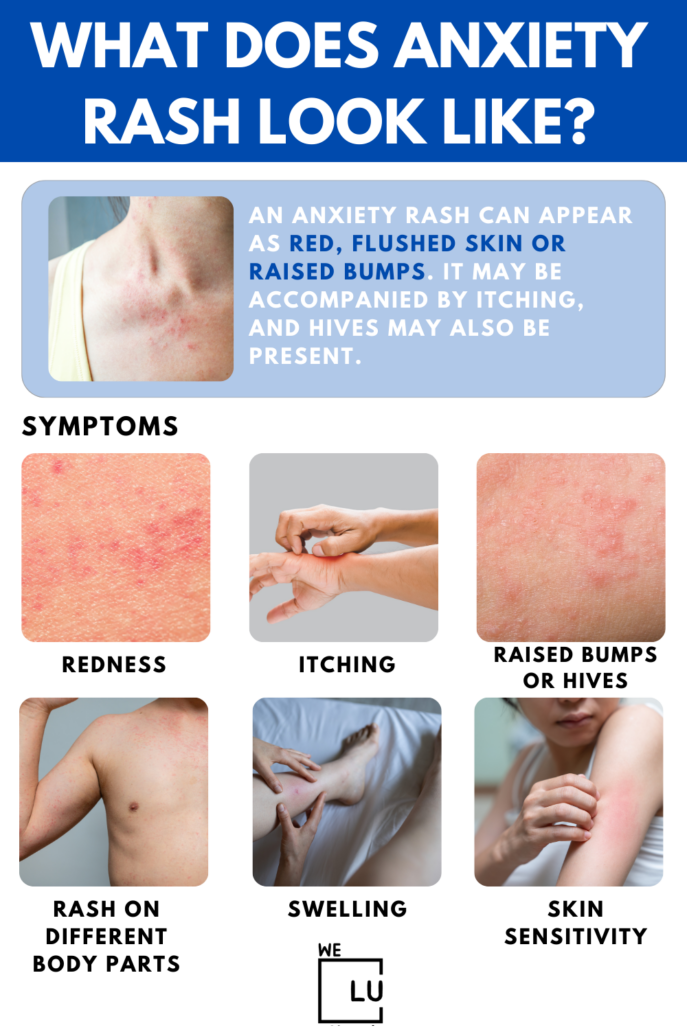
Most Common Medical Treatments for an Anxiety Rash
While these OTC medications may provide relief for mild anxiety rashes, it’s crucial to consult with a healthcare professional if symptoms persist or worsen. They can offer personalized advice and recommend stronger prescription medications if necessary.
- Antihistamines: Over-the-counter antihistamine medications like cetirizine (Zyrtec), loratadine (Claritin), or diphenhydramine (Benadryl) can help relieve itching associated with anxiety rashes.
- Hydrocortisone Cream: Available without a prescription, hydrocortisone cream can be applied topically to reduce inflammation and redness in the affected areas.
- Calamine Lotion: This over-the-counter lotion contains ingredients like zinc oxide and calamine, providing a cooling effect and helping to soothe itching and irritation.
- Aloe Vera Gel: Aloe vera gel, available in many drugstores, can be applied to the rash to help cool down and moisturize the skin.
- Oatmeal Baths: OTC oatmeal bath products can be added to bathwater to relieve itching and promote skin healing.
- Antibacterial Creams: Over-the-counter antibacterial creams, such as Neosporin, can prevent infection in case skin breaks due to scratching.
For enhanced effectiveness, combine over-the-counter medications like antihistamines, hydrocortisone cream, and calamine lotion with proactive anxiety management strategies to prevent potential complications. This holistic approach addresses both the physical symptoms of the rash and the underlying emotional factors contributing to anxiety.
By integrating OTC remedies with stress-reducing techniques, such as deep breathing or mindfulness, individuals can foster a comprehensive and more impactful approach to managing anxiety rashes and promoting overall well-being.
Natural Home Remedies for Anxiety Rashes
You can soothe rashes using home remedies like oatmeal baths, aloe vera gel, and chamomile tea compresses. These natural options and stress management techniques offer a well-rounded approach to home care.
- Oatmeal Baths: Soaking in an oatmeal bath can soothe irritated skin and reduce itching associated with anxiety rashes.
- Aloe Vera Gel: Applying natural aloe vera gel directly to the affected areas can relieve cooling and promote skin healing.
- Chamomile Tea Compress: Using cooled chamomile tea as a compress on the rash can have anti-inflammatory and calming effects on the skin.
- Coconut Oil: Applying coconut oil to the chest rash from anxiety and other body parts can moisturize and nourish the skin, potentially reducing redness and irritation.
- Cold Compress: A cold compress on the rash can help constrict blood vessels, reducing inflammation and providing temporary relief from itching.
- Lavender Essential Oil: Adding a few drops of lavender essential oil to a carrier oil and applying it to the rash may have calming effects on the skin and the mind.
While these natural remedies may offer relief for some individuals, consulting with a healthcare professional for persistent or severe symptoms is essential. Some extreme cases include anxiety neck rash thyroid. Integrating these remedies with stress management techniques can contribute to a holistic approach to anxiety rashes care.

End the Emotional Pain. Get Your Life Back.
Feeling Depressed, Anxious or Struggling with Mental Health Illness? Get Safe Comfortable Mental Health Dual Diagnosis High-Quality Therapy From Counselors That Care. Begin Your Recovery Now.
Hotline (855) 940-6125Treating Underlying Anxiety Disorders
Anxiety is a natural and adaptive response that plays a vital role in helping individuals navigate and respond to perceived threats or challenges. It triggers the “fight or flight” response, releasing hormones like adrenaline to prepare the body for action. While this acute anxiety response is normal and can be beneficial in certain situations, chronic or excessive anxiety can become problematic, negatively impacting both mental and physical well-being.
In anxiety disorders, individuals may experience persistent and heightened levels of anxiety even in the absence of immediate threats. This can lead to various emotional and physical symptoms, including restlessness, irritability, muscle tension, and difficulty concentrating.
Managing anxiety often involves a combination of therapeutic approaches, lifestyle changes, and, in some cases, medication to help individuals regain control over their thoughts and emotions, fostering a healthier and more balanced mental state.
- Cognitive-Behavioral Therapy (CBT): A therapeutic approach that helps individuals identify and modify negative thought patterns and behaviors associated with anxiety.
- Medications:
- Selective Serotonin Reuptake Inhibitors (SSRIs): Commonly prescribed antidepressants that can help alleviate symptoms of anxiety.
- Benzodiazepines: Medications that may be used for short-term relief of severe anxiety symptoms.
- Lifestyle Changes:
- Regular Exercise: Physical activity has been shown to reduce anxiety and improve overall mental well-being.
- Adequate Sleep: Establishing healthy sleep patterns is crucial for managing anxiety.
- Stress Management Techniques: Incorporating relaxation techniques, mindfulness, and breathing exercises into daily routines.
- Support Groups: Participating in support or therapy groups provides a sense of community and shared experiences, fostering emotional support.
- Communication with Healthcare Providers: Maintaining open and honest communication with healthcare professionals ensures appropriate monitoring and adjustment of treatment plans.
- Mindfulness and Meditation: Practices such as mindfulness meditation can help individuals become more aware of their thoughts and emotions, promoting a calmer mental state.
- Nutritional and Herbal Supplements: Some individuals find relief from anxiety symptoms through supplements like omega-3 fatty acids, magnesium, or herbal remedies—consultation with a healthcare provider before incorporating herbal supplements into the treatment plan.
- Biofeedback and Relaxation Techniques: These approaches involve learning to control physiological responses to stress, contributing to anxiety management.
- Mind-Body Techniques: Practices like yoga or tai chi integrate physical movement with mental focus, promoting relaxation and reducing anxiety.
- Psychoeducation: Understanding the nature of anxiety disorders through psychoeducation can empower individuals to manage their condition better and make informed decisions about treatment options.
The most effective treatment plan may vary for each individual, and consultation with healthcare professionals, such as We Level Up FL mental health treatment, is crucial to tailor interventions to specific needs and circumstances.
First-class Facilities & Amenities
World-class High-Quality Mental Health Services & Behavioral Health Substance Abuse Treatment
Rehab Centers TourRenowned Mental Health Centers. Serene Private Facilities. Inpatient Rehab Programs Vary.
Mental Health Helpline (855) 940-6125Proven recovery success experience, backed by a Team w/ History of:
15+
Years of Unified Experience
100s
5-Star Reviews Across Our Centers
10K
Recovery Successes
- Comprehensive Dual-Diagnosis Treatment
- Complimentary Family & Alumni Programs
- Coaching, Recovery & Development Events
- Comfortable Onsite Medical Detox Center
How To Prevent Anxiety Rashes?
Preventing anxiety rashes involves a comprehensive approach that addresses both the emotional and physical aspects of stress. First and foremost, effective stress management techniques, such as regular exercise, mindfulness, and deep breathing exercises, can significantly reduce anxiety levels and, consequently, the likelihood of developing rashes.
Establishing a consistent and healthy sleep routine is also crucial, as lack of sleep can exacerbate stress and skin reactions. Also, identifying and addressing triggers through therapy or counseling, maintaining a balanced diet, and staying hydrated contribute to overall well-being, creating a protective shield against the manifestation of anxiety rashes.
If you or someone you know is struggling with anxiety rashes and stress symptoms, We Level Up Florida’s mental health treatment center specializes in comprehensive care. Our team of experienced professionals is dedicated to personalized stress treatment plans. Take the first step towards healing and embark on a journey towards improving your health. Contact us today to get started. Each call is free and confidential.
World-class, Accredited, 5-Star Reviewed, Effective Mental Health Dual Diagnosis Programs. Complete Integrated Inpatient Rehab with Free Post Discharge Therapy Planning.
CALL (855) 940-6125End the Emotional Pain Rollercoaster. Gain Stability & Happiness Through Recovery Treatment. Start Mental Health Counseling Today. Get Free No-obligation Guidance by Behaviroal Health Specialists Who Understand Mental Health Recovery.
Powerful Anxiety Coping Tips from a Therapist
Experience Transformative Recovery at the We Level Up Treatment Center.
See our authentic success stories. Get inspired. Get the help you deserve.



Start a New Life
Begin with a free call to a behavioral health treatment advisor. Learn more about our dual-diagnosis programs. The We Level Up treatment center network delivers recovery programs that vary by each treatment facility. Call to learn more.
- Personalized Care
- Caring Accountable Staff
- World-class Amenities
- Licensed & Accredited
- Renowned w/ 5-Star Reviews
We’ll Call You
Search We Level Up FL Anxiety Rash Treatment, Mental Health Topics & Resources
Sources
- Shebak SS, Pinkston J, Ali R. Rash Associated With Panic Attacks. Prim Care Companion CNS Disord. 2016 Feb 11;18(1):10.4088/PCC.15l01822. Doi: 10.4088/PCC.15l01822. PMID: 27247834; PMCID: PMC4874754.
- What Does Anxiety Rash Look Like? Bin Saif GA, Alotaibi HM, Alzolibani AA, Almodihesh NA, Albraidi HF, Alotaibi NM, Yosipovitch G. Association of psychological stress with skin symptoms among medical students. Saudi Med J. 2018 Jan;39(1):59-66. Doi: 10.15537/smj.2018.1.21231. PMID: 29332110; PMCID: PMC5885122.
- Chand SP, Marwaha R. Anxiety. [Updated 2023 Apr 24]. In: StatPearls [Internet]. Treasure Island (FL): StatPearls Publishing; 2023 Jan-. Available from: https://www.ncbi.nlm.nih.gov/books/NBK470361/
- Munir S, Takov V. Generalized Anxiety Disorder. [Updated 2022 Oct 17]. In: StatPearls [Internet]. Treasure Island (FL): StatPearls Publishing; 2023 Jan-. Available from: https://www.ncbi.nlm.nih.gov/books/NBK441870/
- Anxiety – MedlinePlus (.gov)
- Anxiety Disorders – Substance Abuse and Mental Health Services Administration (SAMHSA)
- Anxiety – VA Mental Health (.gov)
- Women and Anxiety – Food and Drug Administration (FDA)
- Any Anxiety Disorder – NIMH – National Institutes of Health (NIH)
- Anxiety and Depression – Census Bureau Search (.gov)
